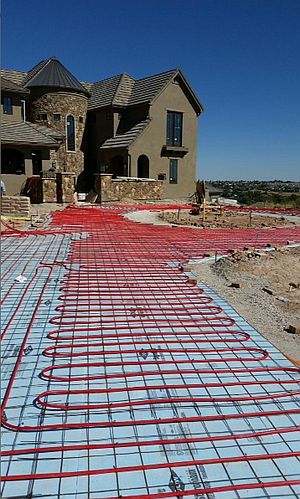
Heated paver driveway Denver CO
When it comes to maintaining a clear and ice-free driveway during the harsh winter months in Colorado, homeowners often consider various heating options. Two popular choices are electric heating systems and glycol heating systems. Both methods offer effective snow melting solutions, but they differ in terms of installation costs, operational expenses, and long-term maintenance. In this article, we will delve into the cost comparison between electric heating and glycol heating for driveways.
Electric heating systems by Proline utilizes heating cables or mats installed beneath the driveway’s surface to generate heat. These systems are typically easier and more affordable to install compared to glycol heating systems. The upfront cost of an electric system depends on the size of the driveway and the complexity of the installation. On average, electric heating can cost between $8 to $20 per square foot, including both materials and labor.
Electric heating systems offer efficient operation, as they convert nearly all the energy consumed into heat. However, the main cost associated with electric heating lies in its operational expenses. Since electricity prices vary by region, it is crucial to consider the local rates to estimate the ongoing costs accurately. On average, electric heating systems can consume between 30 to 60 watts per square foot, resulting in considerable energy consumption.
Glycol heating systems, also known as hydronic heating systems, use a mixture of water and glycol-based antifreeze circulated through pipes beneath the driveway. These systems are more complex to install and generally involve higher upfront costs compared to electric heating. The cost of a glycol heating system depends on factors such as driveway size, insulation requirements, and the need for additional equipment like a boiler or pump. On average, glycol heating can cost between $15 to $25 per square foot, including materials and installation.
Although the initial investment is higher, glycol heating systems can provide long-term cost savings. The operational costs of glycol heating depend on the cost of fuel, such as natural gas or propane, needed to heat the fluid. These systems are highly efficient, with energy conversion rates ranging from 85% to 95%. Additionally, fuel costs are often more stable than electricity rates, reducing the uncertainty of long-term expenses.
Comparing Costs:
To determine the most cost-effective option, one must consider both the installation and operational costs over the system’s lifespan. Electric heating systems generally have lower upfront costs, but their ongoing energy consumption can result in higher operational expenses in the long run. Conversely, glycol heating systems require a larger initial investment but offer potential savings through lower fuel costs.
It is essential to note that the cost comparison may vary based on several factors, such as local energy prices, climate conditions, and driveway usage. Homeowners in regions with lower electricity rates may find electric heating more economical, while those in areas with stable fuel prices could benefit from glycol heating.
Conclusion:
Choosing between electric heating and glycol heating for driveways requires careful consideration of various factors, including upfront costs, ongoing operational expenses, and long-term maintenance requirements. While electric heating systems are typically more affordable to install, they can result in higher energy consumption and associated costs. In contrast, glycol heating systems require a larger initial investment but offer potential savings through lower fuel costs and higher efficiency.
Ultimately, homeowners should assess their specific needs, budget, and local conditions to determine the most cost-effective and efficient solution for their driveway heating requirements. Consulting with professionals in the field can provide valuable insights and help make an informed decision, ensuring a clear and safe driveway throughout the winter months.
Call Stone Creek Hardscapes in Denver for a Free Estimate for Heated driveways. You’ll be glad you did!
